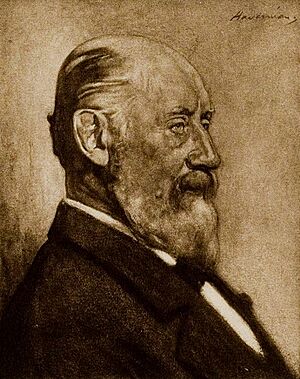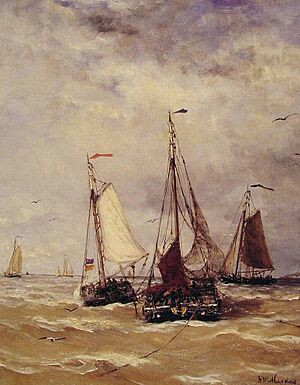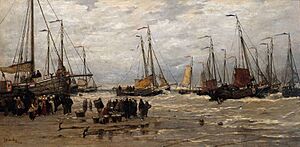Hendrik Willem Mesdag facts for kids
Quick facts for kids
Hendrik Willem Mesdag
|
|
|---|---|

Portrait of Hendrik Willem Mesdag
by Hendrik Haverman |
|
| Born | 23 February 1831 |
| Died | 10 July 1915 (aged 84) The Hague, Netherlands
|
|
Notable work
|
Panorama Mesdag |
| Partner(s) | Sina Mesdag-van Houten |
Hendrik Willem Mesdag (born February 23, 1831 – died July 10, 1915) was a famous Dutch painter. He was best known for his amazing paintings of the sea. This type of art is called marine painting.
Contents
About Hendrik Mesdag
Hendrik Mesdag was born in Groningen, Netherlands. His father, Klaas Mesdag, was a banker who also enjoyed painting. He encouraged young Hendrik to study art.
In 1856, Hendrik married Sina van Houten. Later, they inherited a lot of money from Sina's father. This allowed Mesdag to stop working as a banker when he was 35 years old. He then focused completely on his dream of becoming a painter.
Becoming a Marine Artist
Mesdag studied art in Brussels with a painter named Willem Roelofs. In 1868, he moved to The Hague because he wanted to paint the sea.
In 1870, he showed his work at the Paris Salon. This was a very important art show in Paris, France. Mesdag won a gold medal for his painting called The Breakers of the North Sea.
The Giant Panorama Painting
In 1880, a company from Belgium asked Mesdag to paint a huge picture. This picture, called a panorama, would show a view of the village of Scheveningen. Scheveningen is a coastal town near The Hague, right on the North Sea.
Mesdag worked on this enormous painting with help from his wife, Sina, and some students. They finished the artwork, called Panorama Mesdag, by 1881. It is 14 meters (about 46 feet) high and 120 meters (about 394 feet) all the way around!
However, these large panorama paintings were becoming less popular. The company that owned the panorama went out of business in 1886. Mesdag bought the painting himself at an auction. He then paid for its running costs from his own money.
His Art Collection
Mesdag was also part of an art group in The Hague called the Pulchri Studio. In 1889, he was chosen to be its chairman.
In 1903, he gave his house and his large collection of paintings to the Netherlands. His house, located on Laan van Meerdervoort, is now a museum called The Mesdag Collection.
Awards and Recognition
- 1903: He was made a Knight Grand Cross in the Order of Orange-Nassau. This is a special honor in the Netherlands.
 | Claudette Colvin |
 | Myrlie Evers-Williams |
 | Alberta Odell Jones |



